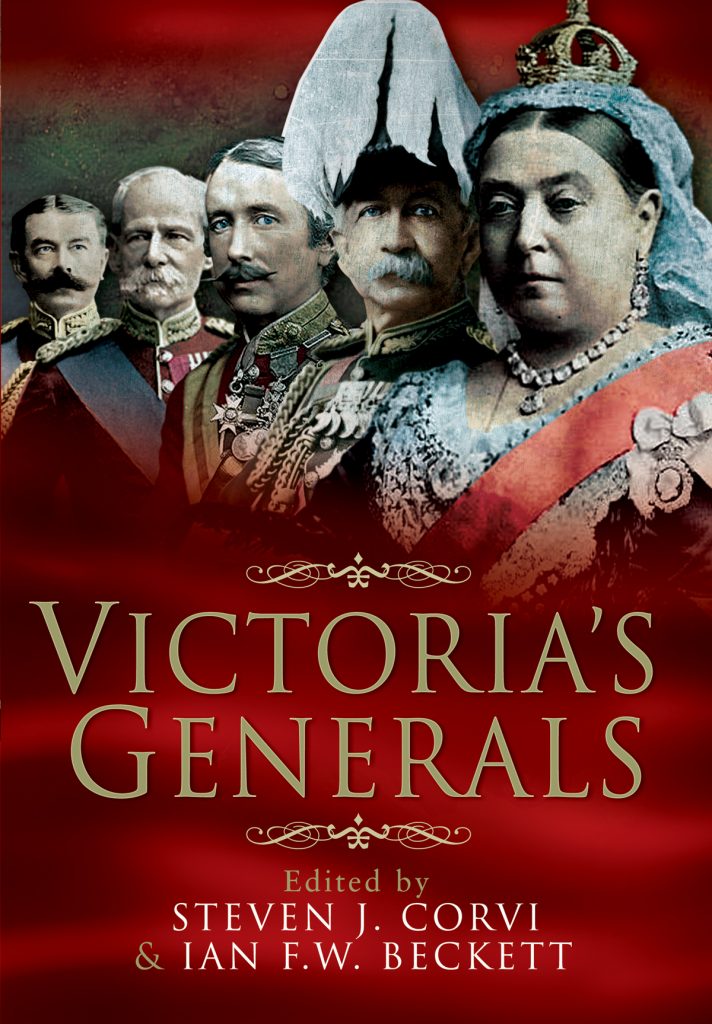Victoria’s Generals. Steven J. Corvi & Ian F. W. Beckett (eds.). Pen & Sword Military, Barnsley 2009. (226 p.)
Recent years have seen a marked growth in interest in all things Victorian. The different forms this phenomenon has taken range from the popular BBC and ITV (mini)series adaptations of Charles Dickens’ beloved novels and the early years of Queen Victoria’s reign to military history enthusiasts sharing information about colonial wars on websites specifically dedicated to the topic. Scholarly contributions have been numerous as well, and the book under review here manages to combine the strengths of two research traditions: more ’traditional’ military history and the ’new’ military history.
Victoria’s Generals focuses on eight British generals of the late Victorian period: Garnet Wolseley, Evelyn Wood, Redvers Buller, George Colley, Lord Chelmsford, Charles Gordon, Frederick Roberts and Herbert Kitchener. Their careers and personalities are analysed in detail by renowned British and American military historians. (Chronology boxes help keeping track of the promotions and important appointments.) Most of them were regarded as heroes by their contemporaries, and while the book manages to paint eight equally fascinating portraits, it does not achieve that at the cost of being uncritical. As the authors point out, this group of men was disparate and fractious – and each of these generals had his weaknesses and contradictions.

The Victorian army was steeped in traditions, and ’character’ was mostly favoured over ’professionalism’ in the officer class. And yet, there were some commanders who actively sought to modernise weaponry and the way the troops were trained and transported. Good examples of this include Wolseley’s strong and vocal support of the use of machine guns and Wood’s introduction of large-scale manoeuvres at Aldershot, the army’s main training base, in which all three branches – infantry, cavalry and artillery – were engaged. Kitchener was thinking outside the box as well when he decided to lay railway tracks across Sudan in order to advance into the heart of the Mahdist State.
One of the most crucial things that separated the leading styles of these generals was their attitude to having a proper staff. John Laband describes Chelmsford’s small staff in South Africa (1878-79) as ’poorly trained and structured’, not selected ’for outstanding talent […] but for easy compatibility’. Thus, Chelmsford’s own organizational abilities came under severe strain. Keith Surridge makes a somewhat similar case concerning Kitchener, who apparently was quite reluctant to delegate. This manifested itself for instance by his rarely giving written orders and sometimes sending telegrams without letting anyone else know about it. A clear contrast is provided by the famous ’Rings’ Wolseley and Roberts built around themselves, striving to find the best men available for each position.
One especially interesting factor is the way these generals treated their subordinates and troops. Wolseley sought results, not affection, and thus he was respected rather than liked. Roberts was perhaps his polar opposite in this respect, as he took care of the well-being of his men and endeared himself to them. These kinds of observations help the reader to gain great insight into their professional and private thinking.
It is noteworthy that countless biographies have been written about Gordon and Kitchener while there is just one about Colley and Chelmsford. Bibliographies and notes show that there is plenty of revealing material to be found in the archives, especially private letters, and combining them with printed sources and research literature, the authors have succeeded in breathing life into each of the eight commanders. Victoria’s Generals has done fine service in illuminating the aspects of personality and leadership – which keeps its chapters from becoming just a long procession of military campaigns. Additionally, it becomes clear that these generals played important administrative roles (like the command of Aldershot) as well, and some, like Wood, Roberts and Kitchener in South Africa, had to manage situations that were complex both militarily and politically. Hence, mere abilities as a battlefield commander were not enough to ensure a successful career.
As Victoria’s Generals is a book about military commanders in the decades of frequent colonial warfare, it is only natural that each chapter culminates in a detailed analysis of one or two crucial battles or campaigns. Most of them revolve around the Anglo-Zulu War, the Anglo-Transvaal War and the Anglo-Boer War, while in Gordon’s case the obvious, fateful finale happens in Khartoum. The depictions of these bloody confrontations are highly dramatic, but the authors do not stray from scientific objectivity and bring in details, like killing wounded enemies, that would by today’s standards be considered war crimes. Research of this caliber is a world apart from the simplistic hero worship of the period in question.
I highly recommend Victoria’s Generals to anyone with an interest in (British) military history and especially to those who wish to understand how the personalities of these high-ranking military commanders affected their decisions and what kind of different skills were required of them. In addition, the book tells a larger story of how British army went through many ’low-intensity’ conflicts that did not adequately prepare it (and its organisation) for the ultimate test of Victorian period: fighting the determined, well-trained and well-armed Boers. All in all, Victoria’s Generals is a highly useful and balanced sourcebook, which has potential of sparking further interest in any of its ’protagonists’. Critical reassessment of famous soldiers at its very best!
Taneli Hiltunen is a post-graduate student at the School of History, Culture and Arts Studies (major: World and European History) at the University of Turku, Finland. He is currently working on doctoral dissertation about the Victorian battle accounts of the Mahdist War.